Twenty-five years ago we didn’t know that solar energy, including modular photovoltaic (PV) plants ranging in size from 1 kW to hundreds of megawatts, along with increasingly larger, electronically-aided wind generators (up to 8-MW offshore units), would become in just 25 years the cornerstones of a revolution in power production that is drastically changing the face and fate of power systems.












 JOIN SSIT
JOIN SSIT